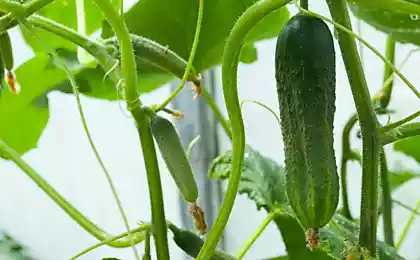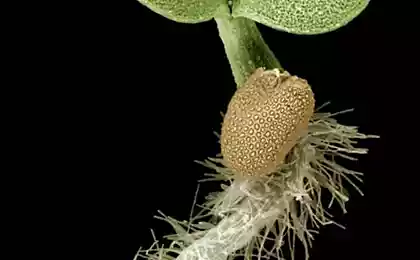770
Lilac: types, varieties, characteristics of growing
Lilac, thanks to its decoration, unpretentiousness to growing conditions, are very popular in the world of flowering shrubs and her star of fame does not fade with age.
Brief Botanical sprawled lilac (Syringa) from the family Maslinic has about 30 species, native to northeast Asia, Iran. It is deciduous, rarely evergreen shrubs with simple leaves and numerous fragrant flowers of various colors (from white to purple), gathered in large inflorescences are panicles. Fruit – capsule, ripen in September-October. Currently created more than 2,000 varieties, differing in colour, degree of Terry, size of flowers and inflorescences.
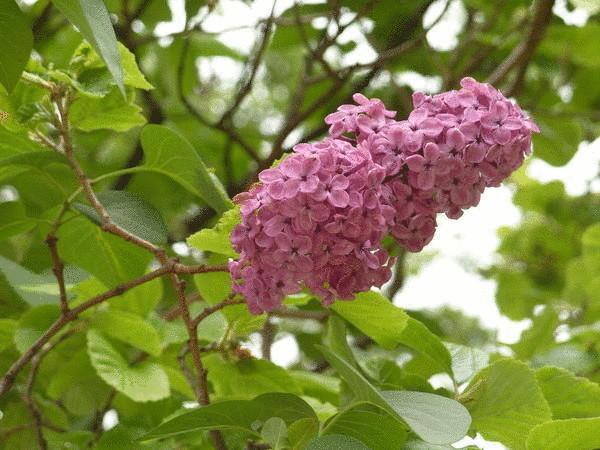
First look at the most popular types of lilacs.
Lilac амурская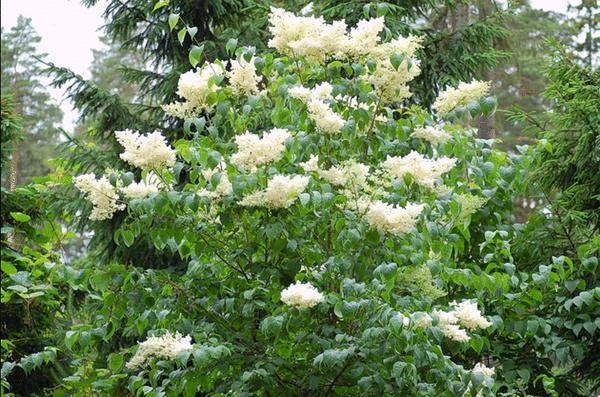
The Amur lilac (Syringa amurensis) is a shrub or tree height of 4-5 (10) m. Leaves broadly ovate, slightly wrinkled, with a length of 5-12 cm, at blooming greenish-purple, summer – dark green, autumn colour is orange-yellow. The flowers are fragrant, white, creamy or greenish white, in dense paniculate inflorescences, with a length of from 10 to 30 cm; bloom in may-June, later than other lilac 2-3 weeks. Is growing quickly. Honey. Homeland: Far East, Northeast China, Korea.
Lilac венгерская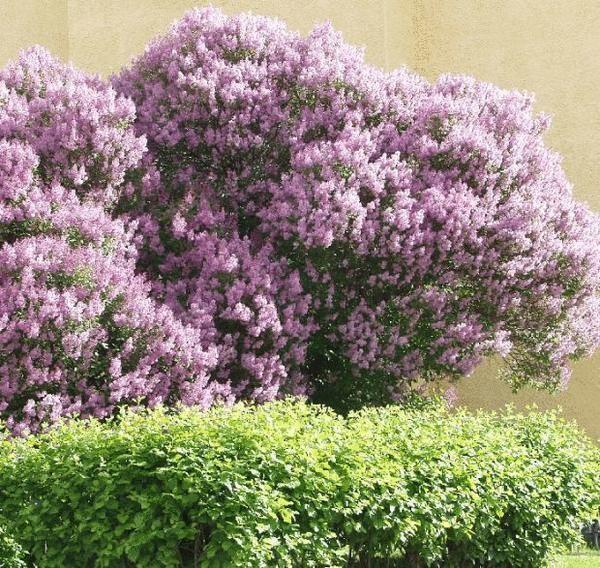
Hungarian lilac (Syringa josikaea) is a densely branched shrub up to 3-4 (7) m. the Leaves are large, up to 12 cm, shiny, oblong-elliptic, dark green. The flowers are very fragrant, purplish-pink in loose panicle; bloom may-June, later some species of lilacs. Grows fast, root suckers does not. Birthplace: Carpathians, Transylvania. There are ornamental forms.
Lilac китайская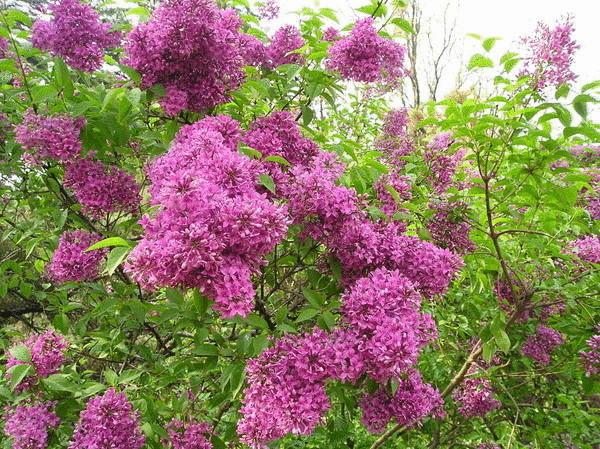
The Chinese lilac (Syringa x chinensis) is a hybrid of the common and Persian lilacs. Shrub up to 5-6 m with thin drooping shoots. Leaves oblong-ovate, 3 to 10 cm Flowers are very fragrant, lilac-purple, in loose panicles up to 17 cm; bloom in may-June.
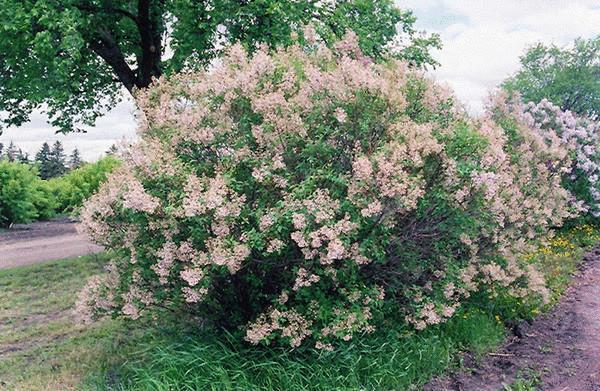
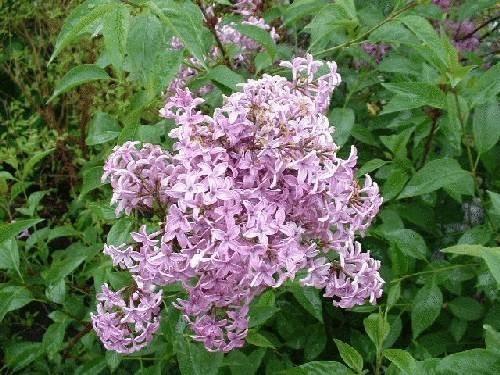
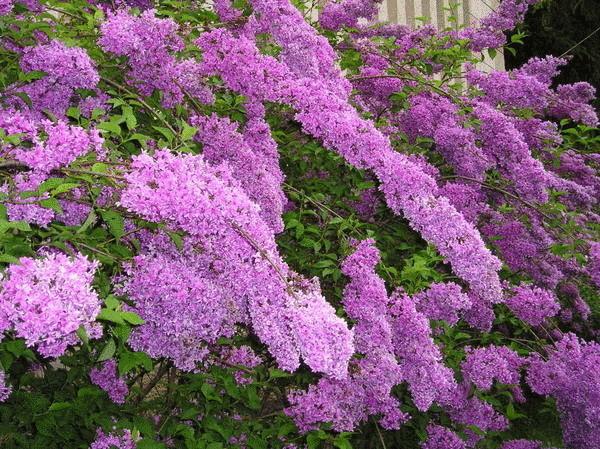
Lilac Мейера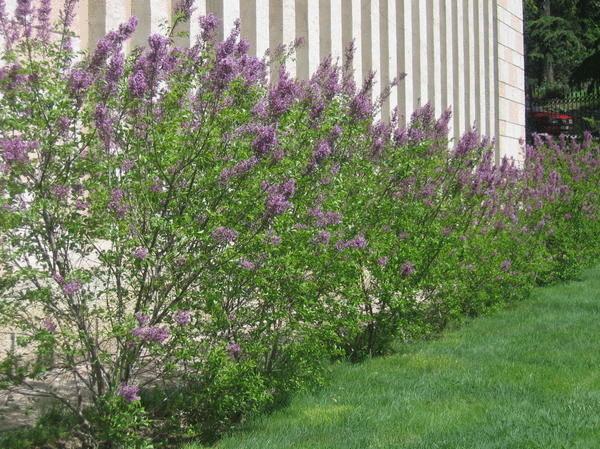
The Meyer lilac (Syringa meyeri) is a compact shrub up to 1,5-1,8 m. the Leaves are broadly oval at the apex tapering, length 2-4 cm, dark green. The flowers are fragrant, pale lilac-pink, in erect inflorescences with a length of 3-10 cm; bloom in may-June. The advantage of this species is early entry at the time of flowering. Known only in culture, found in China. In the middle zone of Russia in the harsh winter may be damaged by frost.
Lilac furry, or волосистая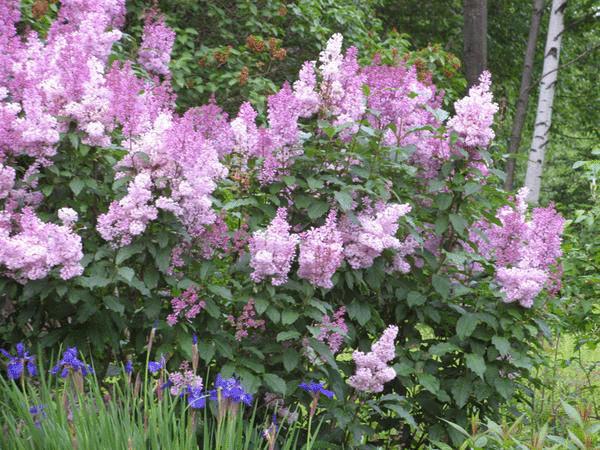
Lilac furry, or hairy (Syringa villosa) is a dense compact shrub to 4 m. Leaves broadly elliptical, with a length of 5-18 cm, shiny on top, bare, bottom, with sparse hairs. The flowers are fragrant, with the smell of Privet, pink, collected in dense, pubescent panicles, up to 24 cm; bloom in may-June, later some species of lilacs. Is growing quickly. Homeland: China, North Korea. There are ornamental forms.
Lilac обыкновенная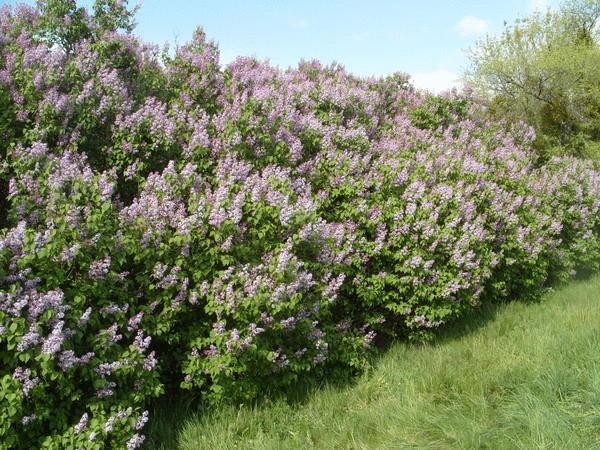
Common lilac (Syringa vulgaris) is a shrub up to 4 (7) m. Leaves are ovate, dark green, length 5 to 13 cm Flowers are very fragrant, lilac, located in the upper part of the shoot in pyramidal panicles, length 10-20 cm; bloom in may-June. Give rich shoots. Withdrawn a large number of decorative varieties. Birthplace: Eastern Yugoslavia, Western and southern Romania, Bulgaria, North-Western Turkey.
Lilac персидская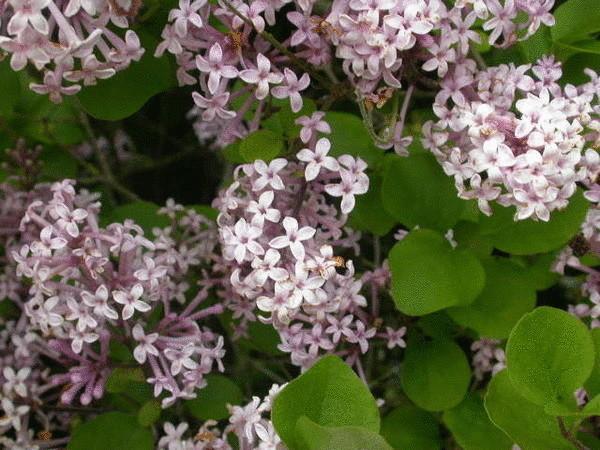
The Persian lilac (Syringa x persica) is a hybrid lilac Afghan and Malandrino. Shrub 2.5-3 m long, with thin, arched branches. Leaves lanceolate, 2-7. 5 cm Flowers are fragrant (the smell is specific, not typical of lilac), lilac-pink, in loose, broad panicles up to 10 cm; bloom in may-June. In the middle zone of Russia in the harsh winter may be covered with ice. A decorative shape: ‘Alba’ (flowers white).
After types get acquainted with the best varieties of the common lilac.
Common lilac cultivar 'Jeanne d'arc'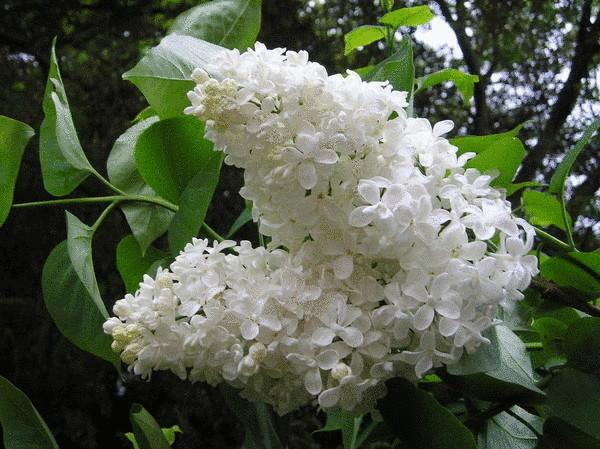
Foreign variety with sumptuous blooms and a strong fragrance, developed by Lemoine (Lemoine) in 1902 Bush* average height, broad, spreading. The buds are creamy-white, flowers pure white, double, strong scent; collected in rounded inflorescences, up to 15 cm Flowering profusely for 17 days.
Common lilac cultivar 'Marceau'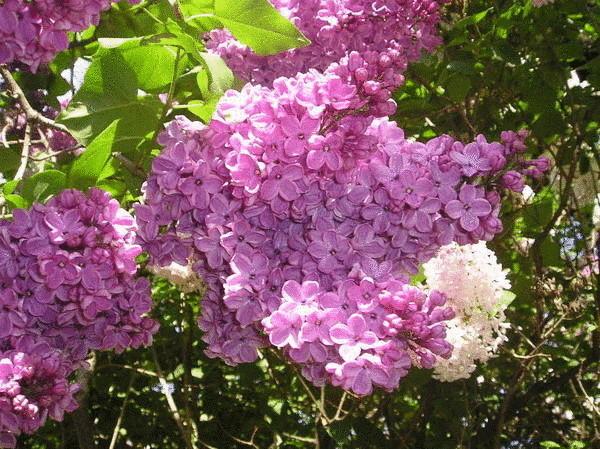
Foreign variety with very large flowers, developed by Lemoine (Lemoine) in 1913, high Shrub, spreading. The buds are dark purple, flowers deep purple (fade to purple), simple, with an average flavor; collected in broad, loose inflorescence, length up to 24 cm Flowering moderately for 2 weeks.
Common lilac cultivar 'Mme Lemoine'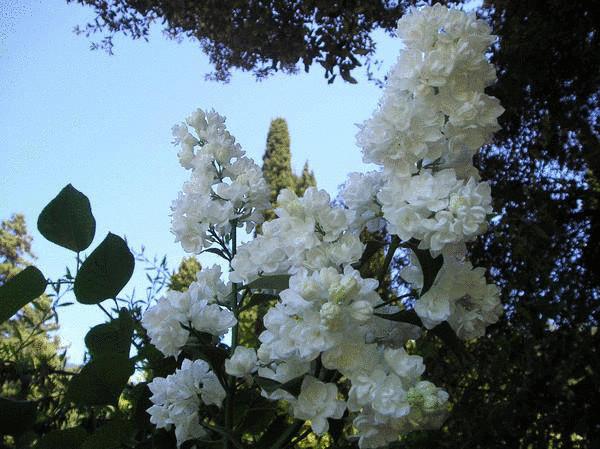
Foreign variety with flowers of a beautiful shape, developed by Lemoine (Lemoine) in 1894 Bush tall, upright. Buds greenish-cream, the flowers are pure white, double, strong scent; collected in a pyramidal inflorescence, up to 15 cm Flowering profusely within 2 weeks.
Common lilac cultivar 'Mrs Edward Harding'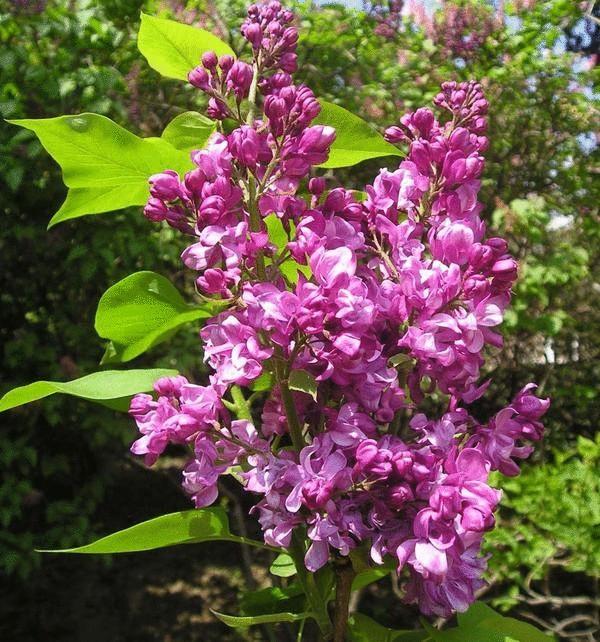
A foreign variety with a beautiful shape of flowers and early flowering, developed by Lemoine (Lemoine) in 1922, the Bush is upright, medium height. Buds purple, flowers pink-purple, double, medium scent; collected in a dense inflorescence pyramidal, up to 25 cm Blooms profusely for 16 days.
Common lilac cultivar 'Paul Hariot'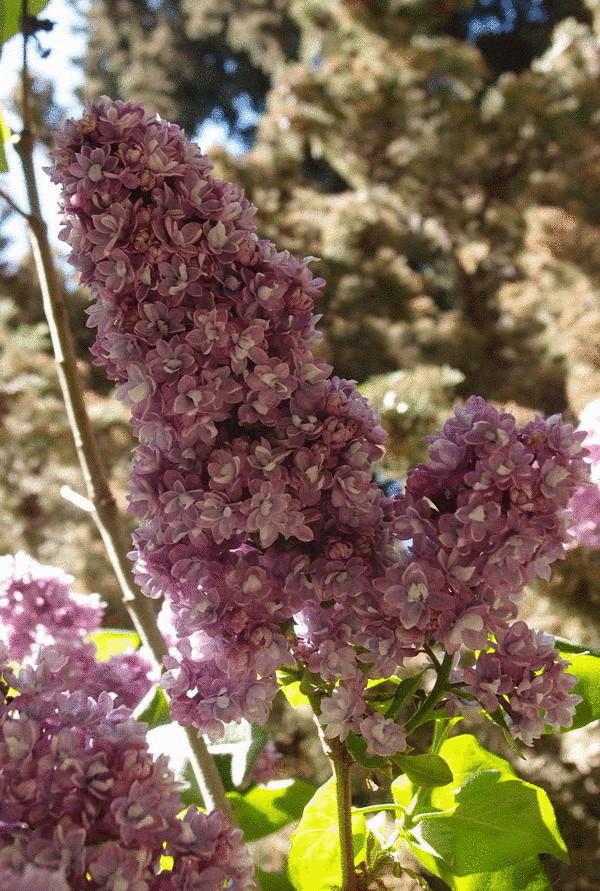
Grade foreign selection, developed by Lemoine (Lemoine) in 1902, spreading Shrub, medium height. Buds purple-violet, purple flowers with a silvery reverse side (can burn), Terry, with a weak odor; collected in a narrow-pyramidal, dense inflorescences up to 16 cm Blooms early, for 17 days.
Common lilac cultivar 'Sensation'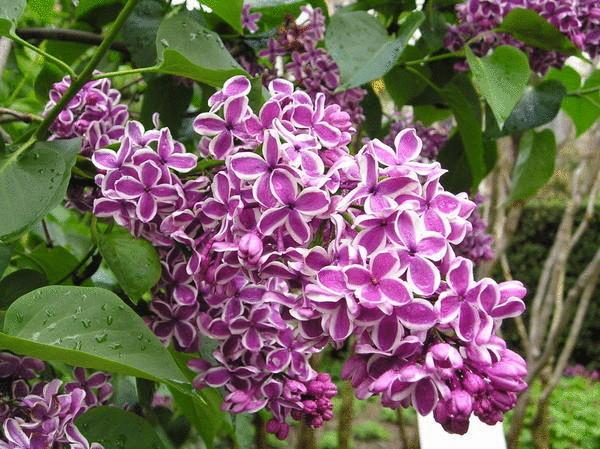
A foreign variety with a unique color of flowers, created in 1938 Maarse Bush of medium height, upright. Buds reddish purple, flowers purple with a wide white border around the edge of the halo, simple, with a weak odor; collected in a dense, pyramidal inflorescence, length up to 19 cm Blooms profusely for 16 days.
Common lilac cultivar 'Blue'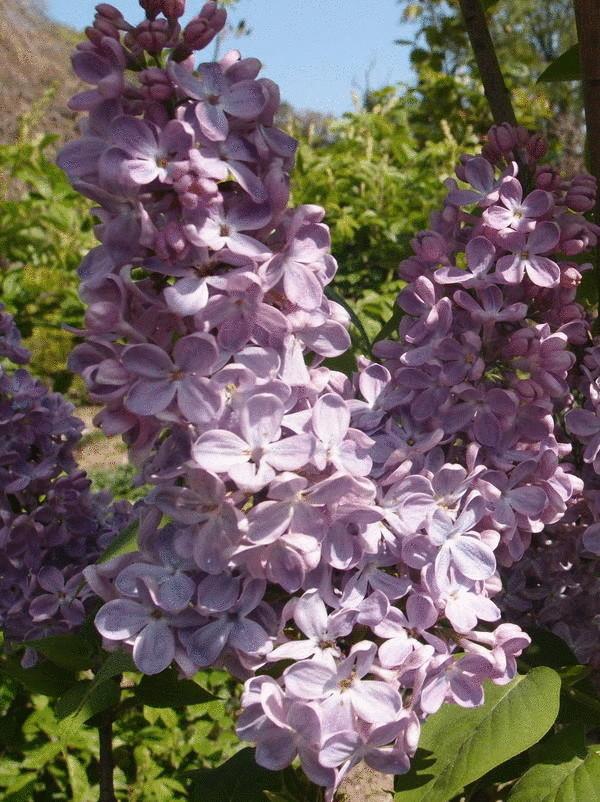
Rare variety with color shades of blue, created by L. Kolesnikov in 1974 Bush tall, upright. The buds are purple, the flowers are purple-blue (unable to burn), simple, with an average flavor; collected in pyramidal, dense inflorescences, up to 20 cm Flowering profusely for 17 days.
Common lilac cultivar 'Beauty of Moscow'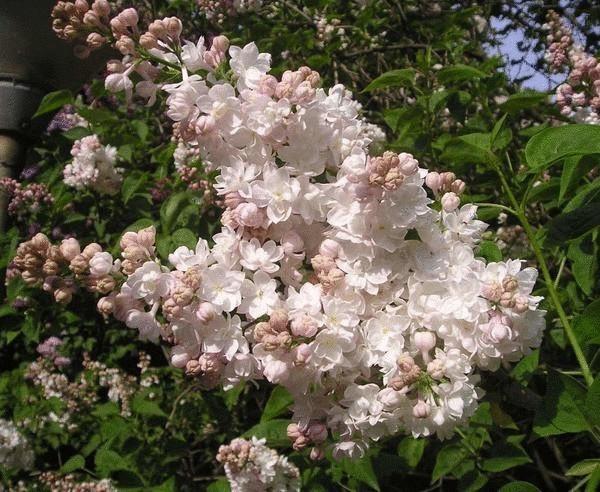
One of the most beautiful varieties of the world assortment of lilac. Grade established L. I. Kolesnikov in 1947, the Bush is tall, broad. The buds are lavender-pink, flowers pink-white, double, medium scent; collected in broad, delicate blossoms, up to 20 cm Flowering profusely for more than 2 weeks.
Common lilac cultivar 'Sky of Moscow'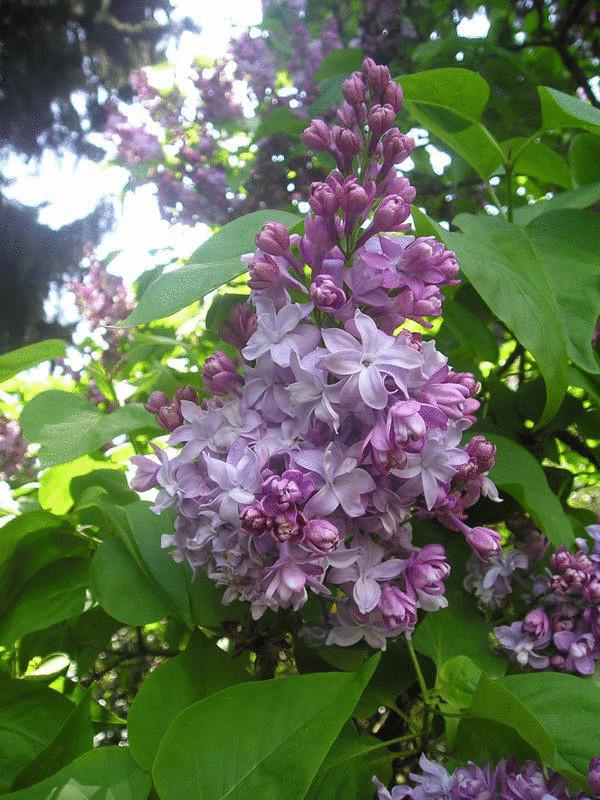
Rare variety with blue tint color, created by L. Kolesnikov in 1963, the Bush is of medium height, broad. Buds purple-violet, flowers violet-blue (fade in the sun), Terry, with a strong flavor; collected in broad, dense inflorescences, up to 12 cm Blooms profusely for 23 days. The variety is resistant to powdery mildew.
Common lilac cultivar 'Lights of Donbass'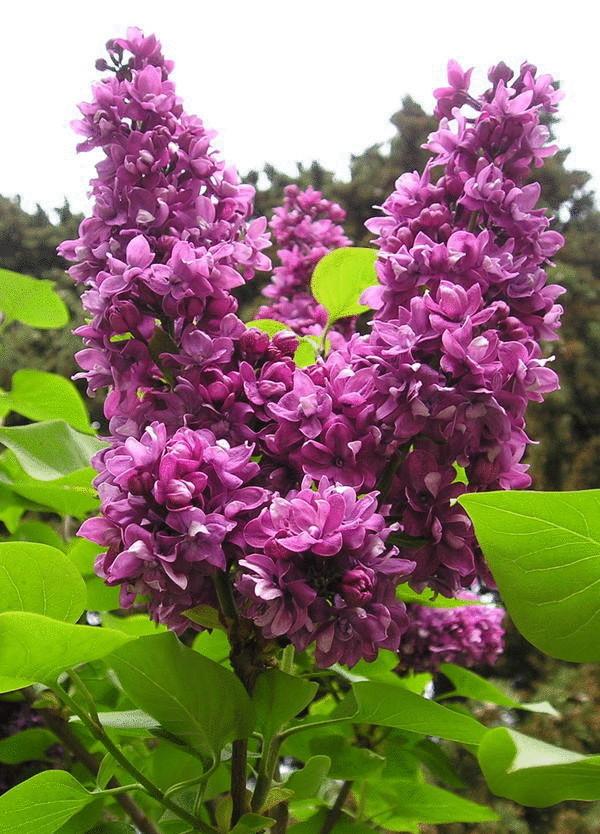
Grade established L. I. Cicatricial, V. G. Gogoleva and N.. Liapunova in 1956, the Buds are dark purple, the flowers are Magenta-purple with lavender tips, Terry, with a strong flavor; collected in a narrow-pyramidal, dense inflorescences, up to 20 cm, Blooms very early and profusely for 20 days.
Common lilac cultivar 'Olimpiada Kolesnikova'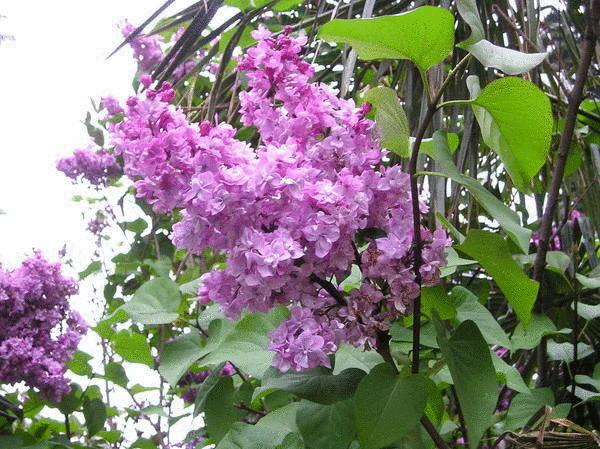
Grade established L. I. Kolesnikov in 1941. Bush tall, upright. The buds are purple, the flowers are purple-pink, double, very fragrant; gathered in the pyramid, delicate blossoms, up to 20 cm Flowering early, for 18 days. The variety is resistant to powdery mildew.
Common lilac cultivar 'Sevastopol Waltz'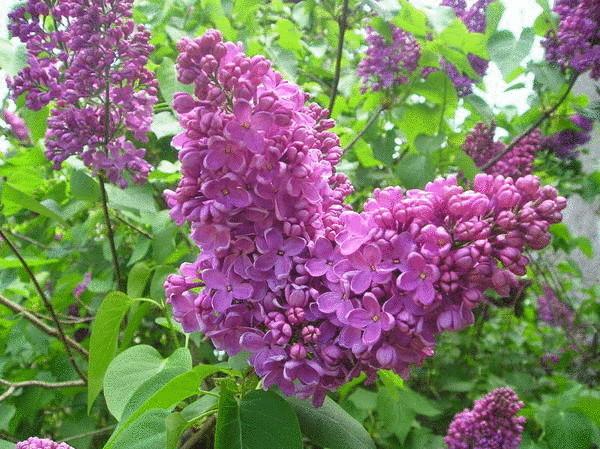
Grade established in the Nikitsky Botanical garden of V. N. Klimenko Z. K. Klimenko, V. K. Zykov in 2013, the Bush is tall, broad, thick. The buds are reddish-purple, the flowers are intense pink-purple nemahrovaya, with a strong flavor; collected in pyramidal panicles, up to 18 cm Blooms for 15 days.
*The height of the lilac Bush is considered high if reached 3 meters or more, medium height to 2.5 m low – less than 2.5 m.
Features of vyrashivaniem bloom best in open, Sunny places, are fairly undemanding, tolerate hot and dry climate, prefer a fertile, slightly acid and neutral, not too dry soils with low groundwater levels; stable in the city. To stimulate flowering, apply a light pruning in early spring for compact crown — pinched side shoots.
Lilac can be damaged by moth lilac, lilac hawk, lilac moth – Petrenko and be affected by kidney blight, bacterial rot.
Lilacs propagated from softwood cuttings (with the use of stimulants rooting), cuttings, division of shrubs, grafting and seeds stratified.
Nice lilac, in single and group plantings. They are used to create a free-growing or with controlled growth, flowering, high hedges and walls using cut for bouquets. The density of accommodation in the range 70-80 cm Possible exposure of the lower part of the bushes that need to be decorated with quilting low shrubs or herbaceous perennials. To prevent the development of rootstock seedlings is preferable to use own-rooted planting material. For bouquets cut up to 2/3 of the flowering shoots. In bouquets with a vase life is better in the early morning and splitting of the ends of the shoots.published
P. S. And remember, only by changing their consumption — together we change the world! ©
Join us in Facebook , Vkontakte, Odnoklassniki
Source: www.7dach.ru
Brief Botanical sprawled lilac (Syringa) from the family Maslinic has about 30 species, native to northeast Asia, Iran. It is deciduous, rarely evergreen shrubs with simple leaves and numerous fragrant flowers of various colors (from white to purple), gathered in large inflorescences are panicles. Fruit – capsule, ripen in September-October. Currently created more than 2,000 varieties, differing in colour, degree of Terry, size of flowers and inflorescences.

First look at the most popular types of lilacs.
Lilac амурская

The Amur lilac (Syringa amurensis) is a shrub or tree height of 4-5 (10) m. Leaves broadly ovate, slightly wrinkled, with a length of 5-12 cm, at blooming greenish-purple, summer – dark green, autumn colour is orange-yellow. The flowers are fragrant, white, creamy or greenish white, in dense paniculate inflorescences, with a length of from 10 to 30 cm; bloom in may-June, later than other lilac 2-3 weeks. Is growing quickly. Honey. Homeland: Far East, Northeast China, Korea.
Lilac венгерская

Hungarian lilac (Syringa josikaea) is a densely branched shrub up to 3-4 (7) m. the Leaves are large, up to 12 cm, shiny, oblong-elliptic, dark green. The flowers are very fragrant, purplish-pink in loose panicle; bloom may-June, later some species of lilacs. Grows fast, root suckers does not. Birthplace: Carpathians, Transylvania. There are ornamental forms.
Lilac китайская

The Chinese lilac (Syringa x chinensis) is a hybrid of the common and Persian lilacs. Shrub up to 5-6 m with thin drooping shoots. Leaves oblong-ovate, 3 to 10 cm Flowers are very fragrant, lilac-purple, in loose panicles up to 17 cm; bloom in may-June.
- ‘Lilac’ (lilac flowers);

- ‘Saugeana’ (purple-red flowers);

- ‘Duplex’ (flowers semi-double).

Lilac Мейера

The Meyer lilac (Syringa meyeri) is a compact shrub up to 1,5-1,8 m. the Leaves are broadly oval at the apex tapering, length 2-4 cm, dark green. The flowers are fragrant, pale lilac-pink, in erect inflorescences with a length of 3-10 cm; bloom in may-June. The advantage of this species is early entry at the time of flowering. Known only in culture, found in China. In the middle zone of Russia in the harsh winter may be damaged by frost.
Lilac furry, or волосистая

Lilac furry, or hairy (Syringa villosa) is a dense compact shrub to 4 m. Leaves broadly elliptical, with a length of 5-18 cm, shiny on top, bare, bottom, with sparse hairs. The flowers are fragrant, with the smell of Privet, pink, collected in dense, pubescent panicles, up to 24 cm; bloom in may-June, later some species of lilacs. Is growing quickly. Homeland: China, North Korea. There are ornamental forms.
Lilac обыкновенная

Common lilac (Syringa vulgaris) is a shrub up to 4 (7) m. Leaves are ovate, dark green, length 5 to 13 cm Flowers are very fragrant, lilac, located in the upper part of the shoot in pyramidal panicles, length 10-20 cm; bloom in may-June. Give rich shoots. Withdrawn a large number of decorative varieties. Birthplace: Eastern Yugoslavia, Western and southern Romania, Bulgaria, North-Western Turkey.
Lilac персидская

The Persian lilac (Syringa x persica) is a hybrid lilac Afghan and Malandrino. Shrub 2.5-3 m long, with thin, arched branches. Leaves lanceolate, 2-7. 5 cm Flowers are fragrant (the smell is specific, not typical of lilac), lilac-pink, in loose, broad panicles up to 10 cm; bloom in may-June. In the middle zone of Russia in the harsh winter may be covered with ice. A decorative shape: ‘Alba’ (flowers white).
After types get acquainted with the best varieties of the common lilac.
Common lilac cultivar 'Jeanne d'arc'

Foreign variety with sumptuous blooms and a strong fragrance, developed by Lemoine (Lemoine) in 1902 Bush* average height, broad, spreading. The buds are creamy-white, flowers pure white, double, strong scent; collected in rounded inflorescences, up to 15 cm Flowering profusely for 17 days.
Common lilac cultivar 'Marceau'

Foreign variety with very large flowers, developed by Lemoine (Lemoine) in 1913, high Shrub, spreading. The buds are dark purple, flowers deep purple (fade to purple), simple, with an average flavor; collected in broad, loose inflorescence, length up to 24 cm Flowering moderately for 2 weeks.
Common lilac cultivar 'Mme Lemoine'

Foreign variety with flowers of a beautiful shape, developed by Lemoine (Lemoine) in 1894 Bush tall, upright. Buds greenish-cream, the flowers are pure white, double, strong scent; collected in a pyramidal inflorescence, up to 15 cm Flowering profusely within 2 weeks.
Common lilac cultivar 'Mrs Edward Harding'

A foreign variety with a beautiful shape of flowers and early flowering, developed by Lemoine (Lemoine) in 1922, the Bush is upright, medium height. Buds purple, flowers pink-purple, double, medium scent; collected in a dense inflorescence pyramidal, up to 25 cm Blooms profusely for 16 days.
Common lilac cultivar 'Paul Hariot'

Grade foreign selection, developed by Lemoine (Lemoine) in 1902, spreading Shrub, medium height. Buds purple-violet, purple flowers with a silvery reverse side (can burn), Terry, with a weak odor; collected in a narrow-pyramidal, dense inflorescences up to 16 cm Blooms early, for 17 days.
Common lilac cultivar 'Sensation'

A foreign variety with a unique color of flowers, created in 1938 Maarse Bush of medium height, upright. Buds reddish purple, flowers purple with a wide white border around the edge of the halo, simple, with a weak odor; collected in a dense, pyramidal inflorescence, length up to 19 cm Blooms profusely for 16 days.
Common lilac cultivar 'Blue'

Rare variety with color shades of blue, created by L. Kolesnikov in 1974 Bush tall, upright. The buds are purple, the flowers are purple-blue (unable to burn), simple, with an average flavor; collected in pyramidal, dense inflorescences, up to 20 cm Flowering profusely for 17 days.
Common lilac cultivar 'Beauty of Moscow'

One of the most beautiful varieties of the world assortment of lilac. Grade established L. I. Kolesnikov in 1947, the Bush is tall, broad. The buds are lavender-pink, flowers pink-white, double, medium scent; collected in broad, delicate blossoms, up to 20 cm Flowering profusely for more than 2 weeks.
Common lilac cultivar 'Sky of Moscow'

Rare variety with blue tint color, created by L. Kolesnikov in 1963, the Bush is of medium height, broad. Buds purple-violet, flowers violet-blue (fade in the sun), Terry, with a strong flavor; collected in broad, dense inflorescences, up to 12 cm Blooms profusely for 23 days. The variety is resistant to powdery mildew.
Common lilac cultivar 'Lights of Donbass'

Grade established L. I. Cicatricial, V. G. Gogoleva and N.. Liapunova in 1956, the Buds are dark purple, the flowers are Magenta-purple with lavender tips, Terry, with a strong flavor; collected in a narrow-pyramidal, dense inflorescences, up to 20 cm, Blooms very early and profusely for 20 days.
Common lilac cultivar 'Olimpiada Kolesnikova'

Grade established L. I. Kolesnikov in 1941. Bush tall, upright. The buds are purple, the flowers are purple-pink, double, very fragrant; gathered in the pyramid, delicate blossoms, up to 20 cm Flowering early, for 18 days. The variety is resistant to powdery mildew.
Common lilac cultivar 'Sevastopol Waltz'

Grade established in the Nikitsky Botanical garden of V. N. Klimenko Z. K. Klimenko, V. K. Zykov in 2013, the Bush is tall, broad, thick. The buds are reddish-purple, the flowers are intense pink-purple nemahrovaya, with a strong flavor; collected in pyramidal panicles, up to 18 cm Blooms for 15 days.
*The height of the lilac Bush is considered high if reached 3 meters or more, medium height to 2.5 m low – less than 2.5 m.
Features of vyrashivaniem bloom best in open, Sunny places, are fairly undemanding, tolerate hot and dry climate, prefer a fertile, slightly acid and neutral, not too dry soils with low groundwater levels; stable in the city. To stimulate flowering, apply a light pruning in early spring for compact crown — pinched side shoots.
Lilac can be damaged by moth lilac, lilac hawk, lilac moth – Petrenko and be affected by kidney blight, bacterial rot.
Lilacs propagated from softwood cuttings (with the use of stimulants rooting), cuttings, division of shrubs, grafting and seeds stratified.
Nice lilac, in single and group plantings. They are used to create a free-growing or with controlled growth, flowering, high hedges and walls using cut for bouquets. The density of accommodation in the range 70-80 cm Possible exposure of the lower part of the bushes that need to be decorated with quilting low shrubs or herbaceous perennials. To prevent the development of rootstock seedlings is preferable to use own-rooted planting material. For bouquets cut up to 2/3 of the flowering shoots. In bouquets with a vase life is better in the early morning and splitting of the ends of the shoots.published
P. S. And remember, only by changing their consumption — together we change the world! ©
Join us in Facebook , Vkontakte, Odnoklassniki
Source: www.7dach.ru
Medicinal baths zalmanova can help in diseases that were considered incurable
Coma life or the Last dawn



